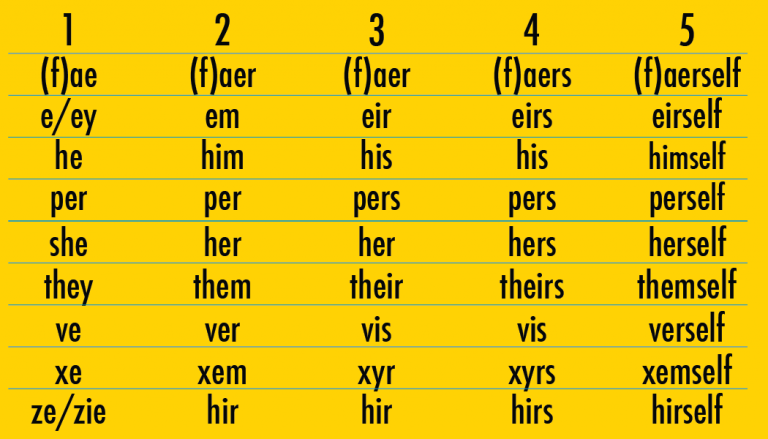LGBTQIA+ Pronouns Guide
Gender Neutral or Gender Inclusive Pronouns
A gender neutral or gender inclusive pronoun is a pronoun which does not associate a gender with the individual who is being discussed.
Some languages, such as English, do not have a gender neutral or third gender pronoun available, and this has been criticized, since in many instances, writers, speakers, etc. use “he/his” when referring to a generic individual in the third person. Also, the dichotomy of “he and she” in English does not leave room for other gender identities, which is a source of frustration to the transgender and gender queer communities.
There are lots of gender-neutral pronouns in use. Here are a few you might hear:
- They/them/theirs (Shea ate their food because they were hungry.) This is a pretty common gender-neutral pronoun and it can be used in the singular.
- Ze/hir/hir (Tyler ate hir food because ze was hungry.) Ze is pronounced like “zee” can also be spelled zie or xe, and replaces she/he/they. Hir is pronounced like “here” and replaces her/hers/him/his/they/theirs.
- Just my name please! (Ash ate Ash’s food because Ash was hungry) Some people prefer not to use pronouns at all, using their name as a pronoun instead.


What if I Make a Mistake?
It can be tempting to go on and on about how bad you feel that you messed up or how hard it is for you to get it right. Please don’t! It is inappropriate and makes the person who was misgendered feel awkward and responsible for comforting you, which is absolutely not their job.
When someone is referred to with the wrong pronoun, it can make them feel disrespected, invalidated, dismissed, alienated, or dysphoric ( often all of the above.)






